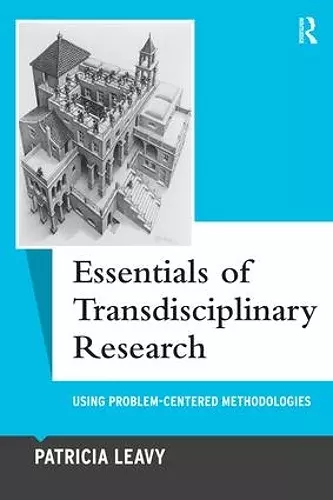Essentials of Transdisciplinary Research
Using Problem-Centered Methodologies
Format:Hardback
Publisher:Left Coast Press Inc
Published:15th Sep '11
Currently unavailable, and unfortunately no date known when it will be back

Transdisciplinary research is issue-driven, addressing contemporary social questions from a range of critical theoretical perspectives unhampered by the theoretical and methodological restrictions of traditional disciplinary boundaries. In this brief, informative guide, Patricia Leavy shows how a transdisciplinary approach can produce more effective results for researchers hoping to ameliorate social problems and foster social justice. Leavy demonstrates the value of transdisciplinary approaches in mixed methods design, and how trans approaches actually help fulfill the promises and goals of mixed methods research. She explains its relationship to multi-disciplinary and interdisciplinary research and its value in community-based and arts-based research projects. Providing the key principles and methods needed to conduct a transdisciplinary study, Leavy also offers numerous examples from multiple research sectors to show its effectiveness. Ideal as a brief introductory text for students engaged in this style of research.
"In Essentials of Transdisciplinary Research Patricia Leavy presents an exemplary and compelling performance of scholarly review, explanation, synthesis, and discussion that will generate, not only a dynamic dialogue about the diverse range of qualitative research methods used in the social sciences, but also a vital vision for shaping research that inquires creatively and conscientiously with contemporary questions of human experience in a cosmopolitan world. As Leavy understands with erudite and eloquent urgency, transdisciplinary research transcends the boundaries of disciplines in order to engage with the kind of essentially and ecologically connected research that can transform how we live together. "--Carl Leggo, poet and professor, University of British Columbia, Vancouver "Essentials of Transdisciplinary Research provides a user-friendly guide to the key principles and research design strategies needed for building a transdisciplinary project. This book is ideal for researchers across the disciplines, graduate students designing theses projects and undergraduate courses in research methods, qualitative research, mixed methods, service learning, or community-based research as well as any courses that emphasize critical thinking, problem solving, problem-based learning and/or research."-AERA Qualitative Research SIG "Leavy (sociology, Stonehill College) has three goals: to identify the shift toward transdisciplinarity in research; to make a case for promoting transdisciplinary approaches; and to provide an introductory guide through research design (as a framework) to assist students and faculty develop and execute transdisciplinary research projects. The author does an excellent job articulating the philosophical, theoretical, and practical aspects of the paradigmatic shifts from discipline-specific research to multidisciplinary and transdisciplinary ways of thinking about research. A strength of the text is the explication of the construct and the related concepts of transdisciplinarity in research. Because transdisciplinarity is an approach to research and not a set of specific methods, Leavy does not show "..how to do".. research, but "..how to think about".. research, using community-based research and arts-based strategies as examples of transdisciplinary research... Valuable as an introductory text for students thinking about transdisciplinary research. Summing Up: Recommended. Upper-division undergraduates and above."-CHOICE Magazine "Perhaps the greatest strength of Leavy's exhaustive presentation of transdisciplinary research practices is its inclusion of and, one might say, amiability towards the different forms of knowledge among both academically inclined and "lay" audiences, and across cultures, that are deemed by Leavy to be equally appropriate in the transdisciplinary research model. Of much importance to the spread of transdisciplinary research, this allows for the realization by "lay" audiences that they can be significant partners in research, unencumbered by the often prohibitively complicated technical and conceptual jargon that pervades much academic literature. Leavy's text is necessary for researchers in both the humanities and the sciences interested in both the study of interdisciplinary research methods as well as their overall applicability to "real-world" problems."--Daniel John Carroll, IMPACT "There has been a fair amount written about transdisciplinarity in the pages ofIntegral Leadership Review, but none of it as practical for scholars, innovators and researchers as this guide to the methodologies. Whether approaching transdisciplinarity from within academia or from communities of interest, business and industry and other stakeholder positions, here is a guide that should prove helpful in thinking not only how to go about addressing evolving issues, but opportunities for innovation in all aspects of life and practice."- Integral Leadership Review
ISBN: 9781598745924
Dimensions: unknown
Weight: 408g
167 pages